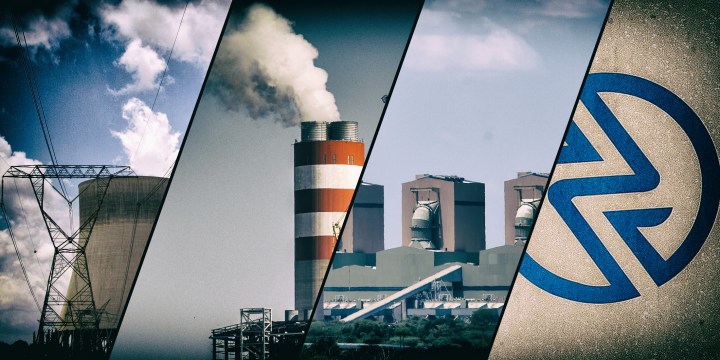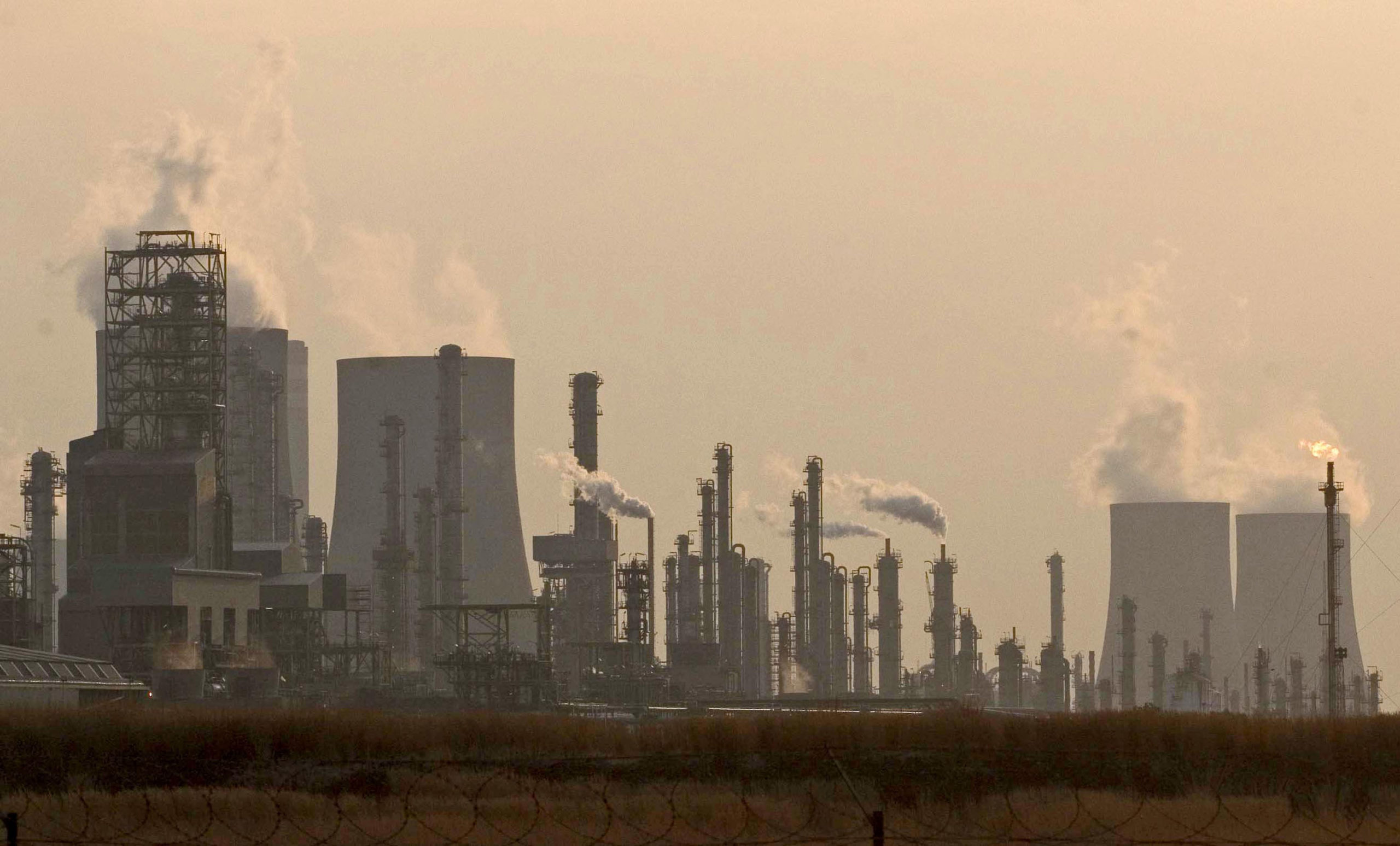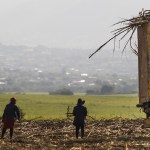OUR BURNING PLANET
The cost of pollution: Eskom, Sasol and the vagaries of environmental law compliance in South Africa

While tonnes of greenhouse gases enter the atmosphere and accelerate global heating, Eskom has told Parliament that it would cost roughly R300bn to update its power plants to be compliant with government-mandated Minimum Emission Standards (MES), while Sasol hopes to be fully compliant after April 2025.
From greenhouse gas emissions to ash and chemical particulate matter, from the billions of rands spent on reducing their environmental impact to the worsened health outcomes and avoidable deaths of people in the worst-affected areas – the costs of pollution in South Africa are as solemn as they are multifarious.
On 17 August the Portfolio Committee on Environment, Forestry and Fisheries held a meeting on the health and economic cost of air pollution in South Africa that was attended by Africa’s worst greenhouse gas offenders: Eskom and Sasol.
Section 24 of the Bill of Rights, as enshrined in the Constitution, states in unambiguous language: “Everyone has the right to an environment that is not harmful to their health or well-being; and to have the environment protected, for the benefit of present and future generations, through reasonable legislative and other measures that prevent pollution and ecological degradation.”
Moreover, as a signatory to the Paris Agreement, South Africa is entreated to fulfil its role in limiting global warming to well below 2°C – ideally at 1.5°C. Daily Maverick has previously noted that the UN Intergovernmental Panel on Climate Change (IPCC) has identified the 1.5°C average temperature increase as a tipping point in the climate crisis.
It says that after reaching this tipping point, we can expect “warming of extreme temperatures” in many regions, increases in “frequency, intensity and/or amount of heavy precipitation” in several regions, and an increase in “intensity or frequency of droughts”.
The most recent addition to the body of scientific knowledge by the IPCC confirmed in a sobering new report that the world is currently at 1.1°C of global heating above pre-industrial conditions and that without substantial reductions in greenhouse gas emissions, limiting warming to close to 1.5°C or even 2°C will be beyond reach. The report also said that we are likely to exceed the lower threshold within the next decade in a scenario marked by low mitigation.
Despite these imperatives, Eskom – South Africa’s single largest contributor to greenhouse gas emissions and global heating – has indicated that it is aiming for 57% MES compliance by 2025 and that total compliance would cost the taxpayer roughly R300-billion.
MES, as legal firm Bowmans notes, “are applied to a wide-ranging list of activities which result in atmospheric emissions that have, or may have, a significant detrimental effect on the environment, including health, social conditions, economic conditions, ecological conditions or cultural heritage”.
In the portfolio meeting, Eskom presented a document titled “Eskom Status of compliance with environmental laws” where the concerning disclosures were made.
Power stations, Eskom said in the presentation, “generally comply” with the conditions of their emission licences issued. Eskom, in its Roadmap document, said that “aside from the commitments to reduce greenhouse gases, the 2010 Minimum Emission Standards require Eskom to take steps to reduce emissions of sulphates, nitrates and particulate matter.
“Progress in this regard is dependent on implementing abatement technologies.”
In the briefing to Parliament, Eskom’s representatives explained that, “due to the excessive financial, outage, and resource requirements of 100% compliance, Eskom adopted a phased and prioritised approach for 57% compliance by 2025”.
Describing the updated 2018 regulations which require Eskom to retrofit plants with flue gas desulphurisation – commonly known as “air scrubbers”– as “onerous”, they argued that “government accepted the 57% compliance phased approach through the approval of the postponement applications in February 2015”.
On 27 March 2020, the Minister of Environment, Forestry and Fisheries, Barbara Creecy, published an amendment to the National Environmental Management: Air Quality Act that, in effect, “doubled the maximum amount of SO2 (sulphur dioxide) that the older large-scale solid fuel combustion installations (coal-fired power plants) used for steam raising or electricity generation may emit, from the previous limit of 500mg/Nm3 (milligrams per normal cubic metre) to 1,000 mg/Nm3”.
Kusile, another of Eskom’s megaprojects, currently has no postponements granted, while Medupi and the rest of Eskom’s fleet of coal-fired power plants have until 2025 to meet existing or new minimum emissions standards for sulphur dioxide.
Eskom indicated that it would cost upwards of R300-billion to ensure that all operational plants fully comply with the MES. This would involve flue gas desulphurisation (FGD) at seven power stations, low NOx (nitrogen oxide) burners at eight stations, fabric filter plants (FFP) at 3.5 stations and electrostatic precipitators (ESP) at four stations.
However, the African energy juggernaut chose a different, less-costly path. As part of its 2019 MES postponement application it said it would install FGD at Medupi, Low NOx burners at four stations and ESP and/or FFP at seven stations at a cost of R67-billion.
“[The above] was put forward as the preferred option in the Eskom postponement application. This option is supported by the ‘just energy transition’ progressing South Africa toward cleaner technologies. This plan will also lead to the continual reduction in emissions and water use from 2020 onwards while avoiding the potential negative impacts of full compliance,” it said in the presentation.
Eskom, however, has fallen behind in this regard when it comes to the 4,800MW coal-fired mega-power station Medupi. A report in News24 highlights how, “Eskom has failed to install flue gas desulphurisation (FGD) technology, commonly known as air scrubbers which scrub the fumes from the station of some of the sulphur dioxide (SO2) that is emitted.”
The report refers to a study by the lead researcher at the Centre for Research on Energy and Clean Air at the University of Helsinki in Finland, which notes that if Medupi runs at full capacity, without the FGD, it could lead to about 90 deaths every year. It is expected that Medupi will run without FGD for at least a decade.

Cooling towers emit steam at the Sasol Secunda plant in the eastern highlands of Mpumalanga. (Photo: Greg Marinovich / Bloomberg via Getty Images)
A 2019 study commissioned by Greenpeace India used Nasa estimates of anthropogenic sulfur dioxide (SO2) emissions from hotspots around the world, based on data from the agency’s satellites and found that, “Kriel in Mpumalanga, with its high concentration of coal-fired power stations, ranks as the second-worst SO2 emission hotspot in the world.” A 2019 assessment by the Department of Forestry, Fisheries and the Environment also found that 10,000 people die each year on the Mpumalanga Highveld from air pollution.
Business Maverick has reported that in an online University of Pretoria lecture, Eskom CEO André de Ruyter said that, “While it may be tempting to demand that the developed world should decarbonise, and allow South Africa to fuel its growth with coal, the reality is starkly different.
“Our economy, on a per capita basis, is 25% more carbon-intensive than China, and double the global average. South Africa emits roughly half the total carbon emitted by the African continent, and Eskom emits about 44% of the total South African carbon emissions. We, therefore, cannot ignore our carbon footprint.”
He reiterated this in the portfolio committee meeting, saying that Eskom had identified several projects to decarbonise its electricity generating systems. About 8,000MW of projects had already been identified which would cost about R180-billion to fund.
Sasol, South Africa’s other major polluter and contributor to greenhouse gas emissions also made a presentation to the committee.
“Sasol is compliant with its obligations – since 2014 we have progressed our compliance journey from 80% of our emission sources being compliant with the Minimum Emissions Standards (MES) to 98% of our emission sources currently being compliant, with the residual point sources being addressed through air quality compliance roadmaps in accordance with postponements granted,” said Marcel Mitchelson, senior vice-president for government relations.
He continued that Sasol was on track to “meet particulate matter (PM), nitrous oxide (NOx) and volatile organic compound (VOC) MES standards by 1 April 2025” at the Sasolburg and Secunda plants and at its joint venture Natref operations. Sasol is “on track to meet sulphur dioxide (SO2) MES standards at our Sasolburg and Natref operations by 1 April 2025”, said Mitchelson.
The single remaining “air quality challenge” is “boiler SO2 compliance at our Secunda steam plant operations. We will not be able to timeously comply by 1 April 2025. We are progressing our ongoing compliance efforts, amongst others through developing coal beneficiation as an abatement option whilst also assessing alternative pathways linked to our GHG emission reduction programme, i.e. an integrated air quality and GHG solution,” he said.
The acting Deputy Director-General (DDG) for Primary Healthcare, Aneliswa Cele, and the DDG for Climate Change Impacts, Bono Nemukula, on behalf of the Department of Health said to the committee that, “South Africa is a country that is reliant on energy generation sources that cause air pollution on a large scale, for both domestic and industrial purposes.”
They continued that, “According to the World Health Organization (WHO), the combined effects of ambient (outdoor) and household air pollution (HAP) (indoor), causes about seven million premature deaths every year, largely as a result of increased mortality from stroke, heart disease, chronic obstructive pulmonary disease (COPD), lung cancer and acute respiratory infections.
“Air pollution is detrimental to human health, with adverse effects that may range from restrictions in physical activity of a person to emergency room visits for asthma or even hospitalisations for respiratory and cardiovascular causes, to premature mortality.
“The economic costs of such effects are considerably large in this country as all the above conditions lead to reduced economic activity of affected people and obviously reduction in economic development of the country.” DM/OBP



















If only environmental lawyers had guts and gumption to really take on transgressors but sadly they sit back drafting opinions and charge big fees! We need pro bono, angry as hell, legal brains to attack both government and industries alike – environmental/social justice is never gonna happen. $$$$$
Maybe the Green Scorpions could do their job. They are already paid by us and were created for this purpose.
…”total compliance would cost the taxpayer roughly R300-billion”…by means of more government bailouts?
Interesting that government focuses on reducing sulphur dioxide levels when the UN’s IPCC report highlights how much they contribute to global COOLING? We do need to distinguish between pollutants that are harmful to health and those that are harmful to the planet because if we don’t control the climate damage, health will suffer regardless.